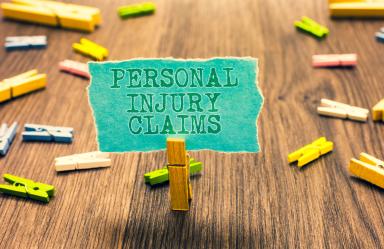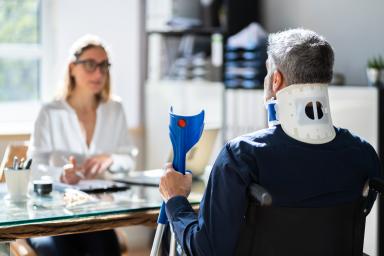Georgia Personal Injury Laws

The scope of personal injury law includes situations wherein a person suffers an injury due to another party’s negligent or intentional act. This legal field encompasses several categories, such as vehicular accidents, premises and product liability, and workers’ compensation.
Some types of personal injury cases have been on the rise in Georgia, as reported by different government agencies. Based on data from the State Board of Workers' Compensation, the number of claims and the value of benefits awarded to injured workers in 2022 increased from the year prior. Crash statistics from the Governor’s Office Of Highway Safety also showed more instances of vehicular fatalities and injuries from 2019 to 2020.
Laws related to personal injury are meant to safeguard victims’ right to obtain justice in the form of damage awards. However, not every section of the law benefits plaintiffs; some — such as the statute of repose — may put them at a disadvantage for technicalities out of their control. In this regard, it’s important to seek the assistance of a personal injury lawyer who knows how to navigate legal procedures and fight for your rights, whether within or outside the state’s court system.
To arm yourself with legal knowledge, you may also wade through this article, which discusses the common types of personal injury cases, Georgia’s at-fault rules, the amount of damages one may seek, and legal resources available to locals.
Motor Vehicle Accident Laws in Georgia
Motor vehicle accidents can be experienced by people of any age at any time. In Georgia, a significant number of these lead to injury deaths, emergency room visits, and hospitalizations. The Georgia Trauma Registry also noted that many injured patients accommodated in the state’s trauma centers have been involved in motor vehicle accidents.
In 2021, over 7,600 motor vehicle crashes — mostly involving cars and light trucks — resulted in serious injuries. Some common causes of these mishaps were alcohol-impaired driving and speeding.
If you are a vehicular accident victim, the at-fault rules of the state indicate that you are entitled to acquire compensation from the party that caused your injuries. One way to hold them accountable is by filing a claim with your insurance provider. You may also directly file a third-party claim against the other party’s insurer since drivers in Georgia are required to purchase liability insurance worth at least:
$25,000 for bodily injury per person.
$50,000 for bodily injury per accident.
$25,000 for property damage per accident.
However, if you are dealing with an underinsured or uninsured driver, your own uninsured/underinsured motorist coverage — if you have one — can pay for the damages you have incurred.
If your claim has been denied or is not adequate, you may also pursue legal action against the at-fault party. You can explore the Expertise.com site to learn more about car, trucking, and motorcycle accident lawsuits in Georgia.
Premises Liability Laws in Georgia
In Georgia, a person who incurs injuries due to a property’s unsafe conditions has the right to sue its owner or occupier or file a claim against their insurance company. Slips and falls are the incidents most commonly associated with premises liability. Other mishaps may be caused by poorly maintained or broken facilities in the form of malfunctioning elevators, uneven paths, or faulty wiring. While some accidents occur in residential properties and government buildings, others take place in commercial establishments like malls, offices, and hotels.
Vicarious Liability
In premises liability cases, if a person performing their duties as an employee causes the victim’s injury, their employer is usually the party deemed liable. However, this does not apply in situations involving contractors and freelancers.
Animal Bites
In the U.S., daily statistics show that around a thousand dog bite victims need emergency medical treatment. Additionally, an average of 800,000 individuals annually receive medical care after being bitten by a dog. In line with this, the Code of Georgia has a specific section regarding liability in animal bite accidents that lead to injury. It states that one is on the hook for being a negligent owner or keeper of a “vicious or dangerous” animal that injures a person.
If you have been bitten by someone’s dog recently and suffered an injury, you may be justified to sue them for your incurred damages.
Product Liability Laws in Georgia
According to Georgia’s statute on strict liability, people injured due to a defective product are within their right to file a case against the product’s manufacturer. The law states that proving the manufacturer’s fault isn’t necessary, but the plaintiff’s side must demonstrate that:
The product was manufactured by the defendant.
The product was defective after it left the manufacturer’s control.
The product’s defect caused the plaintiff’s injury.
A plaintiff’s product liability claim may involve any of the following:
Design defects: If a defect is due to the product’s dangerous or faulty design.
Manufacturing defects: If a defect is due to any flaw in the product's manufacturing process.
Label or warning defects: If a defect is due to the product’s lack of adequate warning or labeling.
Per state law, one may also file legal action against a defective product’s designer, distributor, or seller.
Medical Malpractice Laws in Georgia
Acts of medical malpractice — which range from surgical and diagnostic errors to incorrect lab result readings — can lead to minor and serious injuries, as well as wrongful death. Under the law, victims of medical malpractice have grounds to sue their healthcare providers, who are expected to observe the utmost care while performing their duties toward their patients.
In Georgia, while filing a case against the negligent party, medical malpractice plaintiffs are also responsible for submitting an expert affidavit. This document shows that they have indeed suffered an injury due to their medical provider’s negligence, as corroborated by another professional from the same field.
Workers’ Compensation Laws in Georgia
More than two million cases of workplace injuries in the private sector were reported across the country in 2021, translating to 2.3 incidents per 100 workers. An overwhelming number of these came from the fields of health care and social assistance, likely due to the COVID-19 pandemic. The retail, manufacturing, and transportation industries also logged high figures.
In Georgia, individuals injured due to a workplace accident have the right to obtain benefits for their recovery. They are qualified to receive workers’ compensation from the day they start their job. Based on the severity and length of the injury, a worker’s benefits would be under one of these classifications:
Temporary partial disability: This coverage is for workers who can only go back to a lower-paying role due to their injury. Benefits last until one achieves maximum medical recovery or after 350 weeks.
Temporary total disability: This coverage is for workers who cannot go to work for a minimum of one week. Benefits last until one achieves maximum medical recovery or after 400 weeks.
Permanent partial disability: This coverage is for workers with a permanent disability but can still go back to work. Awards are based on one’s impairment rating.
Permanent total disability: This coverage is for workers with severe injuries, such as amputation, paralysis, or blindness. Awards are also based on one’s impairment rating.
For you to secure workers’ compensation after being injured while on the job, it would be wise to act as soon as possible by reporting the incident to your employer within 30 days. You should also get treated by a health care provider searchable on this physician database and keep any paperwork related to your injury and employment. Additionally, you must submit a filled-out WC-14 form to the State Board of Workers' Compensation, as well as your employer and its insurance company. If your claim is approved, follow your physician’s and the state board’s instructions. Meanwhile, you may request a hearing if your claim has been denied or is insufficient.
Throughout the claims process, it would be wise to get an attorney to help you make the right decisions and perform the tasks you have to accomplish.
Georgia Follows the Modified Comparative Negligence System for Personal Injury Lawsuits
In personal injury cases in Georgia, the plaintiff can obtain damages if they can prove the defendant’s negligence, which can be established through four related components:
The defendant had a duty of care to the plaintiff.
The defendant violated this duty of care.
The violation of the duty of care caused the plaintiff’s injury.
The plaintiff incurred damages due to the injury.
However, even after proving the at-fault party’s negligence, victims found to be partially at fault for their injury will have their compensation reduced. In this case, the amount to be deducted is equal to their degree of responsibility. Therefore, if one is originally awarded $10,000 and is deemed 40% liable, the same percentage will be subtracted from their compensation, which amounts to a final award worth $6,000.
The modified comparative negligence system that the state follows also makes it clear that being 50% or more at fault for one’s injury prevents one from recovering any amount. Hence, if you are filing a personal injury case, it would be prudent to seek the best course of action to ensure you obtain the damages you are entitled to. Hiring an experienced attorney in the field of personal injury law is one way of doing so.
How Much Can Someone Sue For an Injury in Georgia?
No damage caps are in place for most personal injury cases in Georgia. This means a plaintiff may receive any amount of compensation in the form of special and general damages.
Special damages, commonly known as economic damages, are the financial losses a personal injury victim incurs due to a mishap. These include hospital payments, vehicle repair costs, and lost profits. One has to prove them in court through evidence like receipts and bills. General damages, such as bodily pain and suffering, are the non-economic or intangible losses a plaintiff experiences. One does not have to show monetary proof to recover this type of award.
Exception to the Law
Individuals suing another party due to medical malpractice should know that they are only entitled to $350,000 in general damages at the most. Despite this, a court ruling from 2010 awarded a higher amount to the plaintiff, possibly leading to similar instances and an amendment to the law in the future.
Taxability of Damages
Federal law states that economic and non-economic damages arising from physical injuries are not taxable since they are not classified as income. However, if you have deducted any medical costs related to your injury in your past tax return, your awarded damages are bound to be taxed.
Damages as Marital Property
In Georgia, recoverable damages are either marital or personal property; one’s current medical costs and lost wages are conjugal, but future ones are not. Moreover, bodily pain and suffering — something the plaintiff experiences on their own — are treated as personal property.
If you are a personal injury victim who needs legal guidance to navigate various procedures and information, one route you can pursue involves hiring a competent and experienced lawyer who can help you obtain the full amount of compensation you deserve.
The Statute of Limitations for Personal Injury Cases in Georgia
The Limitations of Actions chapter in the Georgian legislation states that personal injury plaintiffs have two years from the date of the defendant’s negligence to pursue legal action. Based on the same section of the law, civil cases involving wrongful death are given the same period, which begins on the day the victim passes away. If the plaintiff is a minor, the two-year clock only starts running when they turn 18.
For medical malpractice lawsuits, the surrounding details could influence the statute of limitations:
One may file a typical medical malpractice case within a two-year timeframe.
If the victim is below 5 years old, one may file a lawsuit after more than two years.
The law also recognizes that not all injuries or illnesses stemming from medical malpractice are immediately felt or uncovered. Hence, if a plaintiff only discovers their injury or illness after the deadline, they are given one year to file a case. Additionally, a lawsuit arising from a foreign object being left in one’s body can still be pursued within one year from the discovery of the item, even after the statute of limitation’s expiration.
However, the statute of repose gives a definitive five-year limit to medical malpractice suits. This means, for instance, a patient is most likely barred from suing their doctor if they only discovered their injury more than five years after their medical procedure.
Meanwhile, personal injury victims planning to initiate a court case against a government entity have to carry out an additional legal procedure; they must first notify the defendant within six months or a year.
Legal Resources for Injured Folks in Georgia
GeorgiaLegalAid.org
A collaboration between the Georgia Legal Services Program and Atlanta Legal Aid Society, Inc., GeorgiaLegalAid.org offers a trove of information that personal injury victims may use to pursue justice for the damages they have suffered. Some topics readers may find relevant include representing oneself in court and knowing how to get the right lawyer. It also has a directory listing over 70 programs and groups one may contact to seek legal assistance.
Georgia Free Legal Answers
The American Bar Association created Georgia Free Legal Answers to help low-income adults in the state with their legal concerns. Because its service is limited to answering any legal queries outside the field of criminal law, it cannot provide representation and file legal documents on behalf of people. For inquiries regarding your personal injury case, you can send a message through the website.
Georgia Legal Services Program
This nonprofit’s legal professionals offer civil law assistance to senior citizens and individuals from low-income households. Its services — either for free or for a minimal fee — are available to people within the state, except in Clayton, Cobb, DeKalb, Fulton, and Gwinnett counties. You may visit the site’s application page to determine if you are qualified to receive personal injury law assistance from the organization.
The State Bar of Georgia’s Client Assistance Program
This program can help personal injury victims by responding to their queries and referring them to lawyers who can assist them further. It also takes action on attorney complaints to solve disputes between clients and their lawyers. For more information, you may contact 404-527-8700 or 800-334-6865.
The Georgia Trauma Commission
This program, founded in 2007 through Senate Bill 60, provides treatment to personal injury victims and other individuals experiencing trauma. Its responsibilities include operating a network of facilities across the state to help patients recover and handling programs to educate trauma care providers. The commission offers various avenues of communication to make its services accessible to trauma patients — it can be reached via phone (706-841-2800), through email (gtcbusinessops@gtc.ga.gov), online, and in person by visiting its office at 248 W Jefferson Street in Madison.
Expertise.com StaffAuthor
Step into the world of Expertise.com, your go-to hub for credible insights. We don't take accuracy lightly around here. Our squad of expert reviewers, each a maestro in their field, has given the green light to every single article you'll find. From rigorous fact-checking to meticulous evaluations of service providers, we've got it all covered. So feel free to dive in and explore. The information you'll uncover has been stamped with the seal of approval by our top-notch experts.




